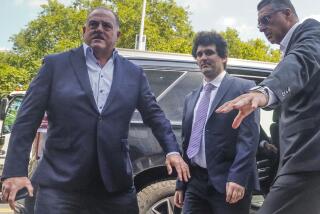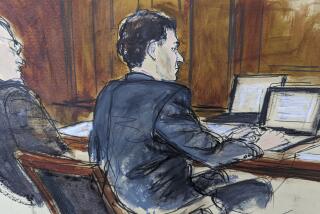‘How Could They Not See It?’
- Share via
HOUSTON — For jurors who convicted Kenneth L. Lay and Jeffrey K. Skilling, weeks of complex testimony boiled down to one simple truth: The former Enron executives not only knew about the company’s failing financial health, but supported the use of accounting chicanery to hide it.
In a group interview at the federal courthouse here, jurors said the parade of prosecution witnesses presented irrefutable evidence against the two men.
“There was some selectiveness on the part of both defendants about who they listened to,” jury forewoman Deborah Smith said. “There were too many instances where the documents were there, the facts were there, and if they were in the same country, how could they not see it?”
Jurors said their task was not an easy one. When jury deliberations began last week, the mountain of evidence was “like a puzzle with 25,000 pieces dumped on the table,” said Wendy Vaughan, the owner of two small businesses. “When we first started you just have to put together one piece at a time. As you get closer to the end, the pieces started to come together.”
Juror Doug Baggett said that after a long day in court, he’d go home “swayed in one direction.” During cross-examination the following day, he’d find himself “going in the other direction. I think we all felt like that, like a ping-pong ball.”
But their task, jurors said, was made simpler by lawyers on both sides who turned what could have been an overwhelmingly complex case into one that could be understood.
“A person like me that knew very little felt as though I could make a very educated decision,” said Kathy Harrison, an elementary school teacher.
When deliberations hit a snag, jurors said they turned to 20 boxes of evidence. “When in doubt, we always went to those boxes. In black and white, it says a lot,” said Freddy Delgado, an elementary school principal.
“We put in long hours with minimal breaks....I don’t think anyone can say they did not get a fair trial in Houston,” he said.
None of the 12 jurors was absent or even tardy for a single day in court, a record that U.S. District Judge Sim Lake called remarkable.
The good attendance was a tipoff that the jury was working well together, said Mark C. Zauderer, a litigator and jury expert with Flemming Zulack Williamson Zauderer in New York.
“When jurors aren’t getting along, you see a lot of headaches and absences,” he said.
Jurors said they were unmoved by defense efforts to impugn the testimony of prosecution witnesses who appeared in court under a plea bargain.
“There was too much evidence that interlinked. Even if the government did persuade them or twisted their arm you cannot get all of them to say the same thing and point to the same evidence,” Delgado said.
None of the jurors believed Lay and Skilling’s claims that they were unaware of deals that artificially inflated Enron’s stock. “It’s hard to believe such hands-on individuals could not possibly know some of the things that were going on in the company,” Harrison said.
Jurors said a key moment in the case came when Lay testified that he sold $70 million worth of Enron stock in 2001 as the company crumbled and employees were left in the dark.
“It mattered very much,” Don Martin, an electrical designer, said. “I thought that was a disgrace to the ethics of the whole thing. It’s horrible when people have money tied up and he’s out there [selling stock]. That was ridiculous.”
Said Delgado: “That was very much just the character of the person he was. He cashed out before the employees did.”
Jurors also said Skilling showed too much command of Enron’s details to be ignorant of fraud going on.
Asked whether the defendants seemed to act, as prosecutors said, with “willful blindness” to wrongdoing by subordinates, Smith, the jury forewoman and a human-relations employee for an oil-services company, said: “It appeared to us there was some selectiveness on the part of both defendants as to who they listened to, who they considered credible.”
Lay’s argumentative tone struck a sour note with some jurors. “He seemed to very much want to be in control when he spoke.... He seemed very focused, like he had a little chip on his shoulder or something. It made me question his character at that point, how controlling he might be,” Vaughan said.
They found Skilling to be equally suspect. Though he essentially gave jurors a seminar on the complex structure of Enron, Skilling later claimed he didn’t know about the accounting tricks used to disguise debt.
“For a man that knew every aspect of that business and seemed to know every deal, why didn’t he know what was going on,” Baggett said.
Juror Harrison said she was glad Lay and Skilling took the stand: “I would have always had questions if they had not. It was enough to reaffirm for me” the decision to convict.
Times staff writer Thomas S. Mulligan contributed to this report.
More to Read
Sign up for Essential California
The most important California stories and recommendations in your inbox every morning.
You may occasionally receive promotional content from the Los Angeles Times.










